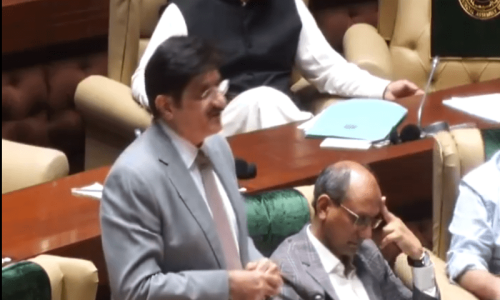 KARACHI, Feb 26: The recent apology tendered by the Pakistan People’s Party (PPP) to the people of Balochistan appears not to have had its desired effect since the founder of the Balochistan National Party (BNP), Sardar Ataullah Mengal, on Tuesday termed the apology a positive but insufficient step, and expressed a lack of hope in the PPP being able to solve the problems of the country’s largest but least populous province.
KARACHI, Feb 26: The recent apology tendered by the Pakistan People’s Party (PPP) to the people of Balochistan appears not to have had its desired effect since the founder of the Balochistan National Party (BNP), Sardar Ataullah Mengal, on Tuesday termed the apology a positive but insufficient step, and expressed a lack of hope in the PPP being able to solve the problems of the country’s largest but least populous province.
“The civil-military bureaucracy has always called the shots here,” he commented.
Sardar Mengal was amongst a number of nationalist Baloch leaders who responded to a resolution passed on Sunday by a meeting of the PPP provincial parliamentary party in Islamabad. In what is also read as an effort to reach out towards the only province where the party is not assured of a share in provincial power, the resolution stated that “The PPP, on behalf of the people of Pakistan, apologises to the people of the province of Balochistan for the atrocities and injustices committed against them and pledges to embark on a new highway of healing and mutual respect.”
However Sardar Mengal and other nationalist Baloch leaders said the situation in the troubled province would remain unchanged until the “colonial perception of the rulers” changed and basic issues such as provincial autonomy were addressed.
Sardar Mengal, who headed the province’s first democratically-elected government in the 1970s, said that the policy statement issued by the PPP was a step in the right direction but was “not enough since the wounds inflicted on the Baloch people were very deep.”
Expressing little faith in the PPP’s ability to solve Balochistan’s issues, he argued that in fact, this was not within the power of any political leadership since the civil-military bureaucracy had always called the shots in the province. He observed that the PPP risked a confrontation with these forces, which continued to prop President Musharraf in his office despite the fact that the people had already given their verdict against him.
“The real rulers have never been serious about finding a lasting solution to the Balochistan issue because of their sinister designs,” stated Sardar Mengal. “Had they been serious about dialogue, we would not have reached the stage we are at today.”
Blaming the rulers for their lust for power and wealth, the BNP leader said that “we are headed towards a very serious crisis and no solution is currently in sight,” maintaining that there was a conflict of interest between Islamabad’s rulers and the Baloch people since the former wanted to exploit resources that rightfully belonged to the latter.
‘PPP’s poor track record’
Taking a similar tone, the secretary-general of the National Party (NP), Mir Hasil Bizenjo, described PPP’s gesture as “welcome” but expressed reservations over the fact that the apology did not specify a time period.
“The pledges made by the PPP government were not implemented when the party came to power earlier,” he pointed out. “Its past record is not too impressive in this regard.” He gave the example of the time when, during the MRD, the PPP signed an agreement with the component parties of the alliance granting maximum autonomy to the provinces. When it came to power in 1988, however, this agreement was bypassed.
“The country would not have reached this volatile stage had the establishment recognised the people’s sovereign rule over the country and their right to control their own resources,” said Mir Bizenjo. “Now, the PPP leadership must initially halt the military operation and set up a commission to inquire into the gruesome murders of Nawab Akbar Khan Bugti and Balaach Marri.”
Yusuf Khan Mustikhan, a central leader of the National Workers’ Party (NWP), echoed these sentiments, saying that a mere apology could not solve the Balochistan problem but, in fact, the core issue of autonomy had to be resolved in line with the expectation of the Baloch people.
“During the MRD, the PPP agreed on the quantum of autonomy by allowing the centre control over defence, foreign affairs and residual subjects, including taxation,” he reiterated. “It did not implement the agreement when it came to power.”
Mr Mustikhan pointed out that the Balochistan issue was basically political in nature and could have been settled had the government adopted peaceful means instead of brute force. Holding the government responsible for the armed conflict in the province, the NWP leader said that “the government could end the deadlock by pulling troops out and granting full autonomy to the province.”














































Dear visitor, the comments section is undergoing an overhaul and will return soon.